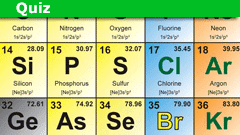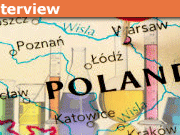It’s Elemental! The Periodic Table Quiz
The periodic table is something we all are made aware of early in schooling, but have you really looked at it closely and learned about it’s lessor known facts? Let’s find out!
Table of Contents
Did you know?
There are many periodic tables with structures different than that of the standard form we use today. Within 100 years of the creation of Mendeleev’s table in 1869 it has been calculated that atleast 700 other periodic table versions were introduced.
Ready for your next quiz? How well do you know about the LHC?
1. What is the Periodic Table?
The Periodic Table is a tabular arrangement of the chemical elements, organized based on their atomic number, electron configuration, and recurring chemical properties. Elements are presented in order of increasing atomic number in rows called periods and columns called groups.
2. Who Created the Periodic Table?
The Periodic Table was created by Russian chemist Dmitri Mendeleev in 1869. Mendeleev’s version of the periodic table organized elements by increasing atomic weight and by their chemical properties, and it laid the foundation for the modern periodic table.
3. How are Elements Arranged in the Periodic Table?
Elements in the Periodic Table are arranged in order of increasing atomic number (the number of protons in the nucleus). The rows, or periods, represent the number of electron shells an atom has. The columns, or groups, contain elements with similar chemical behaviors due to their similar electron configuration.
4. What are the Different Groups in the Periodic Table?
The Periodic Table is divided into several groups: alkali metals, alkaline earth metals, transition metals, post-transition metals, metalloids, nonmetals, halogens, and noble gases. Each group has distinct properties and behaviors.
5. What is the Significance of the Periodic Table in Chemistry?
The Periodic Table is fundamental in chemistry as it provides a framework to understand and predict the properties and behaviors of elements. It helps in understanding chemical reactions, bonding, and trends in element properties.
6. How is the Periodic Table Updated?
The Periodic Table is updated when new elements are discovered or synthesized. The International Union of Pure and Applied Chemistry (IUPAC) is responsible for approving the addition of new elements and their names and symbols.
7. What are Periodic Trends on the Table?
Periodic trends refer to patterns in element properties across the Periodic Table. These include atomic radius, electronegativity, ionization energy, and electron affinity. Understanding these trends allows chemists to predict the properties of elements and their compounds.
8. Are There Different Versions of the Periodic Table?
Yes, there are different versions of the Periodic Table, each designed for specific purposes. These include the standard periodic table, the electron configuration table, and various other versions that highlight different chemical properties and relationships.
I have a BS in Information Sciences from UW-Milwaukee. I’ve helped manage Physics Forums for over 22 years. I enjoy learning and discussing new scientific developments. STEM communication and policy are big interests as well. Currently a Sr. SEO Specialist at Shopify and writer at importsem.com




9/12
Some guesses panned out fine – others didn't
lol. I'm a chemist and I got 7/12.
What is the name of 114th element in the periodic table?
Congratulations – you have completed Periodic Table Quiz.
You scored 8 points out of 12 points total.
Your performance has been rated as [B]Competent.[/B]
For most of the incorrect responses, #4, #9, #11 – did not have sufficient information to make a correct selection. Probability did not land in my favor.
For #6, the info seemed present but not to the point of selection of the correct answer. The kind of question I intend to focus on to improve problem-solving skills.
So 1 to 2 semi-guess / estimates that turned out correct. #2 and #7.
6 correct responses from high level of certainty of knowledge. #1, #3, #5, #8, #10, #12.
[B][/B]
6 at most and doing it again right after that results in only 3 or 4, something really wrong with my mind. I really love to work with those who could reach up 8-12 :nb)
Congratulations – you have completed Periodic Table Quiz.
You scored 8 points out of 12 points total.
Your performance has been rated as [B]Competent[/B].
9/12.
4 out of what? Hmmh
[QUOTE=”PAllen, post: 5104920, member: 275028″]I missed year of periodic table, first element synthesized, and which letter wasn’t in the periodic table.[/QUOTE]
Ha, ha, I beat you in this area. It’s J.
But for the other answers? Flunked many of them :oldlaugh:
[QUOTE=”BiGyElLoWhAt, post: 5108482, member: 496972″]Apparently people didn’t read the did you know? The date for the first periodic table by mendleev is given before you take the quiz =P
[/QUOTE]
D’oh!!
I may not read ‘Did You Know’s, but I do read all the comments in a thread.
I was making a mental note to complain specifically about #8 – I thought it was too hard – either you know it or you don’t. Did not realize it was the easiest of all! :oops:
Well played. Well played.
8/12. I actually missed one question (#9) without realizing it. Guessed at several.
7/12. I made mistakes in the historical ones. I didn’t know a solitaire helped to organise the periodic table…
Why is Lawrencium an Actinide? Shouldn’t numerology place it as a transition metal?
A 10/12 .
4 correct no guess.
4 educated half guesses turned out correct
2 complete guess turned out correct.
More luck than brains, as they say.
[QUOTE=”DrDu, post: 5105024, member: 210532″]I am not so sure about whether Np or Fr is more rare in nature. Np is produced by neutron capture by Uranium. The neutrons stem from spontaneous fission of Uranium. With this hindsight, also the answer “90” in question 1 is more convention than fact.[/QUOTE]
I suppose we would also have to consider the Neptunium released into the environment due to nuclear explosions. ([URL=’http://en.wikipedia.org/wiki/Neptunium#Occurrence’]see this[/URL])
[QUOTE=”Borek, post: 5104972, member: 23711″]And what is the correct answer to 10 (the only letter not in the periodic table)? I can’t think of an element with J nor Q within the symbol.[/QUOTE]
This is just a guess, but perhaps that question was inspired by temporary element names like Ununquadium, and so the answer must be J.
However that name has been replaced by Flerovium ([URL=’http://www.iupac.org/news/news-detail/article/element-114-is-named-flerovium-and-element-116-is-named-livermorium.html’]see here[/URL]), after the Russian laboratory (whose name in turn was inspired by the physicist Georgy Flyorov) that discovered it in 1998.
And what is the correct answer to 10 (the only letter not in the periodic table)? I can’t think of an element with J nor Q within the symbol.
[QUOTE=”Ygggdrasil, post: 5104890, member: 124113″]I’m not sure #9 is correct given that you give ununoctium as a potential answer. Whereas there are maybe only a few ounces of francium, there have probably been only a handful of atoms of Uuo ever made (though Fr might be the better answer given that there probably isn’t any Uuo on Earth at the moment, and according to the IUPAC, Uuo has not been discovered yet).[/QUOTE]
Good call, I’ll correct it
[quote]
Congratulations – you have completed Periodic Table Quiz.
You scored 10 points out of 11 points total.
Your performance has been rated as [B]Excellent[/B].[/quote]
That’s strange because there are 12 total questions. I missed #4 (what did Mendeleev base the periodic table on) and #9 (rarest element). I correctly guessed on #8 (date of the periodic table).
I’m not sure #9 is correct given that you give ununoctium as a potential answer. Whereas there are maybe only a few ounces of francium, there have probably been only a handful of atoms of Uuo ever made (though Fr might be the better answer given that there probably isn’t any Uuo on Earth at the moment, and according to the IUPAC, Uuo has not been discovered yet).
7/12… XDI was wondering, wasn't Astatine the rarest element on Earth?
6/12 from a Finance guy.
Congratulations – you have completed Periodic Table Quiz.You scored 12 points out of 12 points total.Your performance has been rated as Unbeatable.please make corrections.. Hydrogen is in s-block and Helium is in p-block.
Yeah, i agree with you.H – in s-blockHe – in p-block
It seems to me that the lightest of all metals is solid Hydrogen, that is, when pressures are high enough, and temperatures are low enough as we see in the cores of gas giants Jupiter and Saturn. When pressures are low, and temperatures are high, all metals become a liquid, and then (in the extreme) a gas. The lightest solid metal at normal temperatures and pressures is certainly Lithium, but that's not what the question asks, is it?
I got 10 out of 11.
4/12 no guessing here, eh
Haha, just got 4 out of 10. I need to review the table or else my science teacher will get mad at me xD
8/12 and I tutor chemistry at college level……hmmmm
Which element begins with Q?
I scored 11 out of 12. I answered number 11 a little too quickly – shoulda thought it out (silver is Ag). I only scored high because science is bit of a fetish with me, plus some time ago I downloaded Freshny's Periodic Table, an app that can be studied off-line http://download.cnet.com/Periodic-Table-freshney-org/3000-2054_4-10803643.html I highly recommend it to any Chemistry student or aficionado.
You scored 5 points out of 12 points total.Your performance has been rated as Just Passed. hehe
As far as I am concern Helium is in p block .
12/12 Unbeatable
Got 9. The three I got wrong were the historical ones. Why clutter your head with ephemera?
I got 11/12. Good to see that me General Chemistry sequence was not in vain. ;)
One small gripe: a lessor is someone who leases. Try lesser.Btw, Mendeleev almost lost primacy over a mistranslation of periodic into German. Google "fontani mendeleev periodic mistranslated russian"
9/12. Two were educated guesses. I'm ashamed to say I didn't get the year Mendeleev proposed the table even though it's written at the top, as a previous poster noted. The other two I got wrong were the first artificial element and the rarest element
Congratulations – you have completed Periodic Table Quiz.You scored 8 points out of 12 points total.Your performance has been rated as Competent.I guess on alot of the questions
8/12Apparently people didn't read the did you know? The date for the first periodic table by mendleev is given before you take the quiz =P Trick Questions OP
I'll have to get my #1 son the ChemE to answer, I always thought that the table wasn't logical and or missing pieces. I was right 40 years ago. So is the first composite Carbon/Carbon made for the nose cone and leading wing edges of the shuttle a top secret? Composites come out these days for hail proof car panels, fishing poles and tennis rackets; could they with stand the heat of re entry?
9/12. Had to guess at three and got all of them wrong: the Solitaire question, the number of actinides and the year for the periodic table.
6. With two lucky guesses.I picked "J", because I knew it was the youngest of the letters in the alphabet, or so I've read.
I know it's not in the answer choice list, but Astatine is the rarest naturally occurring element. Just an FYI.
There is also a question of what is meant by 'nature' (per the question of how many elements exist in nature). 1) Smartass observatIon: People are part of nature.2) Wouldn't a supernova temporarily produce elements even beyond what people have created (possibly reaching a theorized island of [relative] stability)? Any any given moment (spatial hypersurface) in the universe, I would presume far more than 90 elements exist (without recourse to assumptions about intelligent aliens).
I am not so sure about whether Np or Fr is more rare in nature. Np is produced by neutron capture by Uranium. The neutrons stem from spontaneous fission of Uranium. With this hindsight, also the answer "90" in question 1 is more convention than fact.
I thought it should be J, since that letter is not used in Latin. But then I chose Q.
7/12
I missed year of periodic table, first element synthesized, and which letter wasn't in the periodic table.
I got 9, and since I haven't looked at or thought about a periodic table in at least 10 years, I am quite happy.
What other scores did members get?